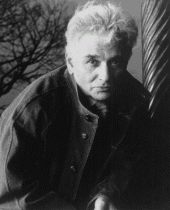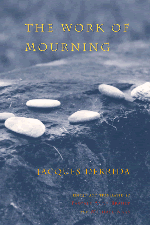For the god of writing is also the god of death. He will punish the imprudent who, in their quest for unlimited knowledge, end up drinking the dissolved book.…To drink the tear and wonder about the strangeness of its taste compared to one's own…
Jean-Marie Benoist, The Geometry of the Metaphysical Poets
To have a friend: to keep him. To follow him with your eyes. Still to see him when he is no longer there and to try to know, listen to, or read him when you know that you will see him no longer—and that is to cry.
To have a friend, to look at him, to follow him with your eyes, to admire him in friendship, is to know in a more intense way, already injured, always insistent, and more and more unforgettable, that one of the two of you will inevitably see the other die. One of us, each says to himself, the day will come when one of the two of us will see himself no longer seeing the other and so will carry the other within him a while longer, his eyes following without seeing, the world suspended by some unique tear, each time unique, through which everything from then on, through which the world itself—and this day will come—will come to be reflected quivering, reflecting disappearance itself: the world, the whole world, the world itself, for death takes from us not only some particular life within the world, some moment that belongs to us, but, each time, without limit, someone through whom the world, and first of all our own world, will have opened up in a both finite and infinite—mortally infinite—way. That is the blurred and transparent testimony borne by this tear, this small, infinitely small, tear, which the mourning of friends passes through and endures even before death, and always singularly so, always irreplaceably. Jean-Marie Benoist, with whom I shared, among so many other things, a veneration for John Donne, will have spoken so well of what he called, twenty years ago, “the geometry of the metaphysical poets,” and of this tear of the world, of world, this world-tear in A Valediction: Of Weeping:
A globe, yea world, by that impression grow,
Till thy tears mix'd with mine do overflow
This world, by waters sent from thee, my heavens dissolveéd so.
Then there comes a time, in the course of a generation, the gravity of which becomes for some, myself among them today, more and more palpable, when you reach an age, if you will, where more and more friends leave you, oftentimes younger than you, sometimes as young as a son or daughter. My admiration, as well as my affection, for Jean-Marie has in fact resembled, for close to a quarter of a century now, that of an older brother who finds himself astonished, and more and more so, though always in a somewhat tender way, by the audacity of thought, the growing force, the justified self-confidence of someone whom he first knew, precisely, with the still tender traits of a very young thinker, but one already sharp, rigorous, ironic, iconoclastic, unsubmissive, covetous above all else of his freedom, his audacity, and his daring. During our first encounters at the Ecole Normale in 1964, I remember having felt some perplexity, along with a sort of irritated concern. But a certain complicity brought us closer together very quickly through our work and our reading, a joyful and confident complicity to which I owe a great deal: it reassured me at a time when I needed it, and it was to do so for years with a constancy for which I will always be grateful, the sort of warm fidelity without which things have little meaning. I like to say “complicity” because often, in the beginning, between 1968 and 1975, a deep agreement (I mean in our philosophical thought and interests) sometimes took on the air of an alliance in a symbolical conspiracy in the midst of the culture of the time. And I liked a lot, indeed I never stopped liking, the mischievous eye, the devilish grin in the middle of that somewhat childlike face, the sometimes biting irony, the polemical verve of Jean-Marie.
I will not speak here of his work, or, I should also say, of his action, of all that is most readily accessible, public, and known: always intelligent and courageous, this work in action was a constant engagement with the philosophical, political, and religious debates of the times. A provocative engagement, sometimes ahead of the times, the conviction of an enlightened avant-gardist, of someone sent out ahead to enlighten us—and I mean this in the sense of the Enlightenment and of his dear Montesquieu. (It was particularly that beacon entitled Marx est mort—in 1970!—that, in spite of my agreement with the essence of the “theses,” an agreement that he invoked in advance, caused me to have some reservations, which I still have today—why conceal it?—concerning the effects sought after, the strategy, the connotations, or, so to speak, the “pragmatics” of the judgment, and these reservations, to which he was sensitive and which he judged, I think, with some severity, had silently begun to separate us, though even when they became more pronounced they never compromised the friendship I have mentioned.) He had an acute sense of the tremors that transform the landscape of history and the ground of thought. (I am thinking here of his very first articles, which announced an entire trajectory, “Towards an International Social Contract,” and “Marcuse, an Aufklärer against Enlightenment,” and then of the two beautiful books that followed in 1975, Tyrannie du logos and The Structural Revolution, which we must read again and again; you will notice, as I have, how well they have held up over time, resisting the various fashions of the day.)
I wish instead to turn today to the “golden years,” those I quietly lament and that are less visibly public: the numerous visits in London at the French Institute or in Oxford when I would come for lectures, the wonderful hospitality of Jean-Marie and Nathalie, everything that happens between friends around an ambassador of culture who is open, intelligent, joyous, inventive, incisive (Jean-Marie Benoist was exemplary in these ways as well), the meetings, the discussions, the “parties,” the nighttime jaunts through the city.
I am presently rereading all the letters from that period, and there are many of them (several spoke of his work in progress, of great books promised on The proper of man and the English metaphysical poets—promised and given through other books and under other titles), and since that time I've always kept on one of my shelves a strange and precious object, something more than precious, in truth, a priceless sign signed by his hand (his large and beautiful black handwriting, high, angular, quick, at once impatient and perfect): a white box on the bottom of which is written “This is not a pipe,” and then, right below, the word “is” under erasure with an x through it: “this is a pipe.” One day (and this is part of a long story) I had confided to Jean-Marie what a certain gift meant to me, a square pipe given to me by my father shortly before his death. This pipe, which stood upright on its bowl when I put it down on the table to write, had been lost many times, found again, broken, repaired—and one day forgotten in London, in the Benoists' living room. Having repatriated it after receiving my telegram, Jean-Marie himself in turn forgot to bring it when he came to visit me on the rue d'Ulm, so he then sent it to me through the mail, recalling, at the bottom of the box, that no, really, between us, and how right he was, this given thing, though it was also one, would not have been a pipe.
I can feel that by writing with a certain tone, and by privileging some memories rather than others, I am letting myself be invaded tonight, at this hour, by English signs: English because I was so happy during our meetings in London (probably more than in Paris, which I blame in the end—blaming myself first of all, of course—when I think that it was things still much too “Parisian,” that is, too provincial, what might appear to be ideologico-political divisions but are, in fact, little more than petty infighting, things that did not concern us, that should not have concerned either him or me, parochial tempests, that ended up “clouding” our relationship; I blame myself for this more than ever today, and for having taken these things much more seriously than they deserved to be, as if death were not keeping watch, as if we were not supposed to see it coming; but I always knew—and I blame myself today for not having told him this—that these clouds left intact in me what they seemed to conceal of my friendship; and even when we had, as we say, lost sight of one another, I remained fascinated at a distance by the grand gestures of this hell of a man, even if I sometimes mumbled to myself); English too because I felt how much England had marked his thinking, about politics in particular; English, finally, because of certain literary passions, as I have said, that I shared with him, and that probably went beyond literature, toward what he called, once again in The Geometry of the Metaphysical Poets, “proper names in shreds,” or “the discourse on shadows,” and, particularly, “anamorphosis and the tear.”
Yes, we must read and reread what Jean-Marie Benoist has left us. I will do so again, but for the moment, between confiding and thinking, which are never totally foreign to one another, I am trying to discern what he will have let us glimpse about tears: through tears.
He does not teach us that we must not cry; he reminds us that we must not taste a tear: “The act of tasting the tear is a desire to reannex the other”; one must not “drink the tear and wonder about the strangeness of its taste compared to one's own.”
Therefore: not to cry over oneself. (But does one ever do this? Does one ever do anything but this? That is the question that quivers in every tear, deploration or imploration itself.)
One should not develop a taste for mourning, and yet mourn we must.
We must, but we must not like it—mourning, that is, mourning itself, if such a thing exists: not to like or love through one's own tear but only through the other, and every tear is from the other, the friend, the living, as long as we ourselves are living, reminding us, in holding life, to hold on to it.

